The Lesch-Nyhan syndrome is a rare hereditary disease caused by a defective gene on the X chromosome. The symptoms appear in different forms and affect both the body and the psyche. Lesch-Nyhan syndrome is incurable, only the symptoms can be alleviated.
What is Lesch-Nyhan Syndrome?

© Giovanni Cancemi - stock.adobe.com
The Lesch-Nyhan syndrome is a rare hereditary disease that leads to a metabolic disorder due to a genetic defect. The modified gene causes a deficiency in the enzyme HGPRT, which is needed for purine metabolism.
The disorder causes the uric acid to rise in the body and the level of uric acid in the blood to rise (hyperuricemia). Gout develops with deposits of uric acid crystals in tendons, joints, skin and cartilage. The deposits also form in the central nervous system and cause disorders there.
The Lesch-Nyhan syndrome occurs only very rarely, in Germany only about 30-40 people are affected. Usually only males get the disease. Women are usually only carriers of the defective gene and pass it on to their offspring. Only if the changed gene is present twice, i.e. in a homozygous state, would women become ill. Lesch-Nyhan syndrome is also called hyperuricemia syndrome or primary childhood gout.
causes
The cause of that Lesch-Nyhan syndrome is a genetic defect that is inherited in an x-linked recessive manner. This means that the mutated gene is on the X chromosome, one of the two sex chromosomes.
Recessive means that someone who inherited only one defective gene will remain healthy if the other gene from the second parent is intact. This also explains why Lesch-Nyhan syndrome mainly affects men. Women have the sex chromosomes XX, while men have XY, i.e. only one X. If females inherit a sick X from one of their parents, they still have the healthy X, which can fully fulfill all functions.
If males get a sick X, the disease breaks out because there is no more healthy X available. Lesch-Nyhan syndrome would only develop in women if they inherited a diseased X chromosome from both parents, which is extremely rare.
Symptoms, ailments & signs
Although Lesch-Nyhan syndrome is a congenital disease, the symptoms do not show up until six to eight weeks after the birth. Previously, yellowish urine residues in the diapers of the affected newborns indicate a serious illness. The first clear sign of Lesch-Nyhan syndrome is an urge to vomit.
The affected babies vomit several times a day, which often results in deficiency symptoms and dehydration. After ten months, further symptoms appear: noticeable leg misalignments, a reduced urge to move and developmental deficits. The parents also notice that the child cannot walk and does not make natural movements.
The mildest form of the disease also increases uric acid levels, which can lead to gout in later life. In the further course, urinary tract infections and kidney stones can also form. The more severe form can be recognized by the malpositions mentioned. The second most severe form can be noticed by the characteristic self-harming behavior of children.
People bite and scratch their lips and fingers, which can cause bleeding, inflammation, and other discomfort. In the most severe form, self-mutilation occurs, combined with severe mental impairment. Affected children are aggressive, constantly bite each other and often attack parents and caregivers as well.
Diagnosis & course
The symptoms of the Lesch-Nyhan syndrome are not present immediately after birth, but arise in the first weeks of life. From the sixth to eighth week vomiting becomes noticeable and there is urine residue in the diaper, which is caused by the increased excretion of uric acid.
Typical signs of Lesch-Nyhan syndrome appear in the following months. The children move little and they lag behind in their development, both physically and mentally. They don't learn to sit or walk, and they can't coordinate their movements properly. You learn to speak with a delay and can only concentrate for a short time. The most noticeable symptom, however, is the uncontrollable compulsion to bite and injure or even mutilate oneself in the process.
However, this behavior only occurs in severe forms of the disease. In the milder form of Lesch-Nyhan syndrome, only the uric acid increases, which over the years leads to gout. The diagnosis is first made on the basis of the symptoms and a measurement of the uric acid level in the blood. A genetic test provides the ultimate certainty as to whether Lesch-Nyhan syndrome is present.
Complications
As a result of Lesch-Nyhan syndrome, those affected suffer from both mental and physical complaints and limitations. As a rule, the quality of life of the patient is significantly reduced and restricted by this syndrome. This leads to vomiting and a reduced urge to move. Furthermore, those affected suffer from an unusual position of the legs, which can lead to bullying or teasing, especially at a young age.
Mental disorders also occur, so that children in particular suffer from underdevelopment and have to reckon with symptoms in adulthood. It is not uncommon for patients to then rely on the help of other people in their everyday life and cannot do many things on their own. Furthermore, self-mutilation can also occur, which can lead to psychological complaints or depression, especially for relatives and parents.
Likewise, the patients often appear aggressive or irritable, which can lead to social restrictions. Lesch-Nyhan syndrome is treated through various therapies and through the use of medication. However, a positive course of the disease cannot be guaranteed in every case. Patients may then be dependent on treatment for their entire life.
When should you go to the doctor?
If the child shows signs of Lesch-Nyhan syndrome, seek medical advice promptly. The pediatrician must be informed if the child vomits frequently one to two months after birth and generally suffers from increasing malaise. If other symptoms and complaints become noticeable, such as a noticeable position of the legs or a reduced urge to move, a doctor must be called in. Lesch-Nyhan syndrome is a serious hereditary disease that, if left untreated, can result in serious complications.
Despite early therapy, the affected children suffer from severe movement restrictions and behavioral disorders, which is why close contact with the family doctor and a physiotherapist is necessary beyond the treatment. In addition, the sick often need psychological care. Any abnormalities in the behavior of those affected must be carefully processed and reduced as part of behavior therapy. Depending on the symptoms, you can also see a urologist, gynecologist, gastroenterologist or nephrologist. The ambulance service is the right contact for seizures and other medical emergencies.
Treatment & Therapy
The therapy of the Lesch-Nyhan syndrome primarily focuses on the symptoms, as the cause of the disease, the genetic defect, cannot be treated. Medicines are administered that lower the urine level and the diet is low in purine.
Furthermore, a high fluid intake must be ensured. These measures are intended to prevent or at least reduce uric acid deposits in the body and the associated impairments. Uric acid levels need to be checked regularly. Furthermore, precautionary measures must be taken regarding self-harm. Soothing drugs such as diazepam (e.g. Valium) but also neuroleptics such as haloperidol have already been used successfully in Lesch-Nyhan syndrome.
Sleeping pills are sometimes given at night to help patients have a reasonably quiet night. The therapeutic measures, however, depend on how severe the severity of the Lesch-Nyhan syndrome is.
You can find your medication here
➔ Medicines to calm down and strengthen nervesOutlook & forecast
Lesch-Nyhan syndrome has an unfavorable prognosis. There is a disposition in human genetics that leads to a disruption of the metabolism. The current legal situation does not allow an intervention to change the human genetic material. Therefore, the cause of the health disorder cannot be eliminated.
Symptoms and irregularities appear in the first few weeks of life. In the entire development and growth process of the sick person, there are various impairments or delays. The cognitive performance is reduced and behavior disorders occur. If left untreated, the symptoms of the disease severely impair the quality of life. There is a possibility of self-harm as well as an increased risk of injuring other people.
Medical treatment is therefore essential for an improved course of the disease. There is a long-term therapy and the administration of medicines. Immediately after stopping the medication, the symptoms return within a short time. Although the disease cannot be cured, the symptomatic abnormalities can be well controlled and monitored in therapy.
Despite all efforts, no freedom from symptoms is achieved. In addition to metabolic disorders, the genetic disease also leads to irreparable developmental disorders. If therapies and targeted exercises are carried out with the patient at an early stage, an overall improvement in quality of life can be observed.
prevention
A prevention against that Lesch-Nyhan syndrome is not possible because it is a hereditary disease caused by a defective gene. If a pregnant woman is known to have the defective gene and if the diagnosis of Lesch-Nyhan syndrome is made in prenatal examinations (before birth), the pregnancy can be terminated.
Aftercare
For many hereditary diseases, follow-up care is very difficult, even for Lesch-Nyhan syndrome. Genetic defects or mutations can have such serious consequences that medical professionals can only mitigate, correct or treat a few of them. In many cases, hereditary diseases cause severe disabilities. Those affected have to struggle with these for life.
What can be done in aftercare often only consists of physiotherapeutic or psychotherapeutic measures. However, successful treatment can be achieved for a whole range of slowly progressing hereditary diseases.In Lesch-Nyhan syndrome, aftercare goes hand in hand with the type of treatment that is designed to get the metabolic disorder under control. As a result, medication aims to bring the uric acid level to a moderate level. The type of diet, which can amount to a specific diet, also plays a major role.
Generalized statements about the type of follow-up care are only permissible insofar as they are made easier for the affected patient as far as possible. Hereditary diseases can cause symptoms that are increasing or remaining constant throughout life. They can significantly reduce the quality of life and lifespan. In the case of many hereditary diseases, operations do not provide much relief. Postoperative follow-up may be necessary.
Some of the symptoms or disorders of hereditary diseases can be treated successfully today. Psychotherapeutic care is useful for hereditary diseases where the characteristics of the disease lead to depression, feelings of inferiority or other psychological disorders.
You can do that yourself
For Lesch-Nyhan syndrome, treatment focuses on reducing the level of uric acid in the blood. This is achieved through medication with the active ingredient allopurinol, accompanied by a change in lifestyle.
The doctor will suggest a diet to the patient at the start of therapy or refer him to a nutritionist. Together with the specialist, a nutrition plan can be drawn up, which ideally consists of a low-purine diet and regular fluid intake. Regular exercise and the avoidance of stress can be important factors in improving lifestyle and permanently reducing the concentration of uric acid in the blood.
If children are affected, the parents must take further measures to prevent the self-harming behavior. For example, it may be necessary to tie up the child or put on a helmet as head protection. In severe cases, the incisors must be removed to prevent the typical self-mutilation. Many patients also need intensive psychotherapeutic care. Since the disease is usually a significant burden for the parents, family therapy can be useful. The therapist can often establish contact with other affected parents.

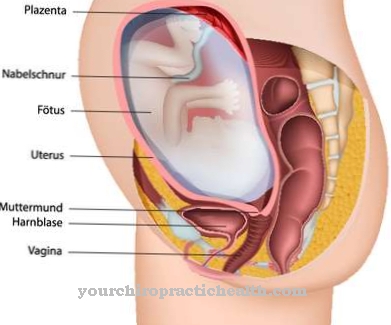
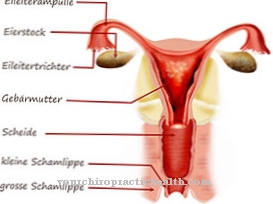
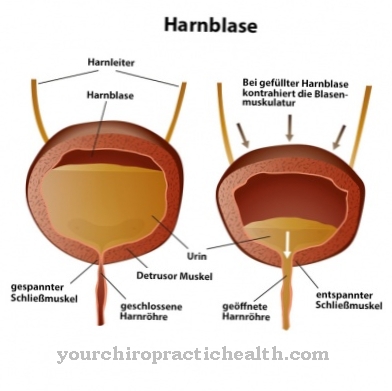
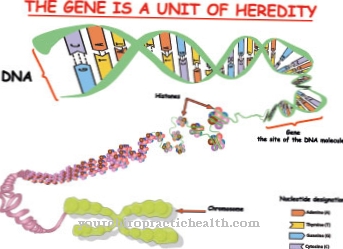
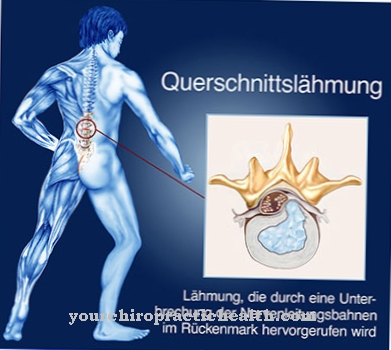


















.jpg)



